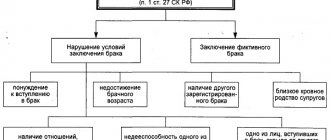Home / Real estate / Acquisition of real estate / Shared ownership
Back
Published: 08/28/2016
Reading time: 7 min
0
3828
Most often, close people have to go to court when it comes to the division of real estate. In order for this procedure to go as smoothly as possible, it must be approached with all responsibility and legal literacy.
Of course, the best option for dividing property is a peaceful agreement between the owners. However, it is not always possible to reach an agreement, so in judicial practice, cases of property disputes between close relatives are not so rare.
- When might it be necessary to go to court?
- Documents required to file a lawsuit
- Algorithm of actions
- Who bears the costs of litigation?
- Whose chances are greater to win the case?
- Judicial practice Example 1
- Example 2
When might it be necessary to go to court?
The most common reasons for litigation regarding the distribution of shares among the owners of residential premises are:
- After the dissolution of the marriage, one of the spouses makes a claim to the allocation of a share from the common shared property, the owner of which he or she is the owner of together with the ex-husband/wife.
- Children from previous marriages of one of the parents or joint descendants wish to receive part of a residential building or apartment as their property;
- Other close relatives (grandparents, brothers/sisters) defend their rights to housing.
Such conflicts are rarely resolved peacefully, so sooner or later one of the parties goes to court.
It is possible to make the trial somewhat easier if you can independently determine the size of the ownership share of each owner.
However, competent implementation of this procedure requires certain knowledge of its immediate mechanism.
A court decision in such proceedings is made on the basis of weighty arguments, so the parties should take care to seriously substantiate their claims to the share of one of the owners.
If sufficient reasons for the transfer of ownership of the residential premises are not presented, then the court, as a rule, makes a decision on the equal distribution of living space.
For example, if the equal owners of the apartment are former spouses, then when a woman raising one or more minor children goes to court, she can expect to be allocated a larger part of the apartment than her ex-husband.
Special conditions of donation
A relative acting in the status of a donee is not obliged to accept a gift; there is no guarantee that the donor’s ideas initially suit the donee or were agreed upon with him.
It is not uncommon for a situation where a gift of real estate is not a benefit, but a serious burden and a significant burden on a person burdened with family relationships. If a relative unexpectedly finds out that an “immovable” but unexpected and clearly inappropriate gift is being made to him, he can refuse it at any time before registering the transfer of rights to him. The agreement will not take place. Such refusal is made in writing.
The donor may not fulfill the contract when significant circumstances unexpectedly arise:
- the situation or health of the donor has deteriorated, which radically changes the possibilities of making a gift;
- an unlawful act has been committed against the donor or his relatives and the person to whom it was planned to donate the rights to the real estate is suspected.
Any option for terminating the contract does not give the recipient the right to demand compensation for losses. Actually, in such a situation there is no gift, no giver, no recipient.
The rules and provisions of the contract and additional agreements are confidential and not subject to disclosure.
A characteristic feature of donation is that significant material benefits are transferred from the possession of one person to the property of another person free of charge. The state's interest in such agreements is understandable and objectively justified.
The factor of the real possibility of covering up selfish interests (registering the sale of real estate under the guise of a gift, for example) is obvious and competent government agencies are studying this kind of situations.
But the psychological aspect and the specifics of family relationships in the context of the gratuitous movement of material goods should still be kept in mind. For example, not only the donee can strive to receive a gift and go out of his way until the right is formalized, and then neglect the donor in any unsightly form.
Achieving an unlawful goal is not excluded on the part of the donor. Without being able to sell property, for example, there is a lawsuit going on, so any movement of material wealth can be blocked according to procedural law, be it civil or criminal proceedings. But gift deeds are less visible in terms of moving tangible things, including real estate rights. Giving children their own apartment is a noble gift! For example, to offset alimony that was not paid on time for the entire time when it should have been done.
Such a transaction is invisible, and in return such a “practical” donor, for example, receives a car registered in the name of another person, or money, or other living space.
Relatives can come up with a sufficient number of options for using gift agreements. And it’s good when these options exist in accordance with the rules of law regarding the movement of material goods and established moral values.
Documents required to file a lawsuit
First of all, the owner needs to write a statement of claim. It is better to entrust this task to an experienced lawyer, since the presence of errors in the document is a reason for the court secretary to refuse to accept the application.
The following documents and their photocopies will also be required:
- Certificates of state registration of marriage or divorce;
- Owner's passports (pages with personal information and registration address);
- Technical passport of the residential premises subject to division;
- A document confirming the applicant’s ownership of the apartment;
- Architectural plan of the premises containing information on the distribution of ownership rights.
In addition to the above documents, the applicant will need to present to the court clerk a receipt for payment of the state fee for the statement of claim.
Its amount is determined by the price of the claim, that is, the market value of the share of the residential premises claimed by the applicant. Determining the price of the claim does not have to be entrusted to a competent employee of the appraisal office; it is enough to indicate the average cost on the real estate market.
However, if the parties cannot reach an agreement in this matter, then it will not be possible to do without the services of a specialist.
Also, the decision to contact a specialist can be made by a judge, based on a relevant request from one of the parties.
How to sue?
The law provides for different cases when it will be possible to win a share in an apartment from the owner. An analysis of court cases shows that this option is more common:
- When dividing property between spouses;
- During proceedings to invalidate a transaction;
- When challenging cases of division of inheritance.
According to Art. 36 of the RF IC, each spouse may have their own property, including residential real estate. For example, if he purchased an apartment before marriage, after a divorce it is not subject to division and remains his property.
But the party that is not the owner has a chance to have such property recognized as common, and, therefore, to have it divided. This is possible if the apartment was significantly improved during the marriage using funds from the general family budget or the personal savings of a spouse who is not its owner (Article 256 of the Civil Code of the Russian Federation).
Based on the articles of Ch. 2 of the Civil Code of the Russian Federation, it is permissible to seize a share in an apartment from the owner in court. This is possible if the transaction by which he received ownership of it is declared invalid. Most often, such a decision is made by judges based on the results of consideration of the following cases:
- The transaction was concluded by a person who is incapacitated, partially incapacitated, or under the influence of drugs that affect consciousness. For example, a sales contract was signed by a person suffering from alcoholism;
- The results of the real estate alienation transaction violated the property rights of a minor or incompetent person. For example, if the guardians sold a share in the apartment belonging to the child, and did not provide another in return;
- The transaction for the alienation of real estate was carried out on conditions that were obviously unfavorable for the former owner. For example, when a citizen was forced to sell his home at a very low price, taking advantage of the fact that he urgently needed money;
- The transaction was concluded by a person who did not have legal authority to do so. For example, an apartment was sold under a power of attorney, the terms of which do not allow the alienation of property.
The list of such cases is much longer. If you wish, you can try to invalidate any transaction, having strong evidence.
Inheritance cases
The procedure of inheritance provides for the receipt of inheritance by law or by will. Errors and violations occur with any method. During such proceedings they try to sue a share in an apartment or all property for the following reasons:
- The heirs who received the property were subsequently found unworthy;
- Extension of deadlines for entering into inheritance. For example, if the applicant did not know about the death of the testator;
- The heir who has the right to a share in the inheritance is deprived.
In such cases, the plaintiff needs to collect evidence of his rights to part of the inheritance and the presence of intentional or unintentional actions of third parties, as a result of which he lost his share.
The plaintiff may be:
- Injured person;
- Supervisory authorities (Prosecutor's Office, guardianship authorities, Pension Fund, etc.);
- Public and educational organizations;
- Relatives of the victims.
To file a claim, a district (city) court of general jurisdiction is selected at the place of residence of the defendant, if it is an individual. When the defendant is a legal entity, public organization, or notary, they choose the court at the location of the structure. This can be done in two ways: during a personal visit to the court office or by sending an application by registered mail.
It is advisable to entrust the writing of the claim to a professional lawyer, because... Such cases are classified as complex. An application to the court is drawn up on the basis of Art. 131 – 132 Code of Civil Procedure of the Russian Federation and contains the following information:
- Information about the court (name, address);
- Details of the plaintiff and defendant. If these are individuals: full name, date of birth, place of residence, passport details. For legal entities: name, legal address, details provided in the extract from the Unified State Register of Legal Entities;
- Title of the document;
- Statement of the circumstances of the case: what the plaintiff sees as a violation of his rights or the rights of another person;
- A proposal to resolve the issue with reference to regulatory documents confirming the correctness of the plaintiff’s claims;
- List of documents attached to the application;
- Date of preparation;
- Applicant's signature with transcript.
The list of documents attached to the application will vary depending on the circumstances of the case. If we are talking about the need to win a share in an apartment, you will definitely need:
- Certificates of the plaintiff and defendant;
- Technical documentation for the apartment;
- Documents confirming the correctness of the plaintiff's claims.
Algorithm of actions
Of course, the best option for both parties is to resolve the issue through a peaceful settlement, but unfortunately, the percentage of such agreements in judicial practice is very small.
- The first thing an applicant should do before going to court is to assess the value of the share of residential premises for which he is applying. You can do this yourself, based on average market prices for housing, or by using the services of a qualified expert.
- The next stage is preparing the necessary documents, making photocopies and paying the state fee. At this stage, it is necessary to decide whether there are sufficient grounds for an unequal distribution of shares among the owners of the apartment. If the reasons for this are compelling, then you also need to prepare documents confirming this (for example, birth certificates of children).
- Then the plaintiff needs to contact an independent examination bureau, which must determine whether the allocation of a share of the residential premises is possible in principle.
- When all the documents have been prepared, the examinations have been completed, and the price of the claim has been determined, you can begin writing the application. Again, it is better to entrust this to professionals.
- The completed statement of claim, package of documents and receipt are provided to the employees of the office of the district court office. By the way, there is the possibility of installments of the state duty or reducing its size: this decision is made by the court based on the petition of the applicant.
- The court's acceptance of documents is accompanied by a letter sent to the plaintiff's address.
From this moment on, he undertakes to participate in court hearings.
In case of a positive decision of the court, the applicant will be allocated a share of the defendant’s property or will be awarded monetary compensation if the allocation of a share of the residential premises is not possible according to the decision of an independent expert.
Who can you sell your share of the apartment to?
If a co-owner of an apartment intends to sell his share, then the pre-emption rule must be followed. This requirement is contained in Art. 250 Civil Code of the Russian Federation. This provision provides that when selling a share, the owner must notify the other co-owners in writing about the upcoming transaction. It is necessary to indicate in the letter the terms of sale and price.
The co-owners have one month to think about it. If none of them wants to purchase part of the apartment, then the owner can sell it to any other person.
The rule of first refusal cannot be ignored. If you do not inform the co-owners about the sale of the share, the case may end in court. Co-owners can file a claim within three months to transfer the rights and obligations of buyers to them. In this case, the court will cancel the original transaction, and the primary buyer will lose the apartment.
Who bears the costs of litigation?
The state fee for the statement of claim is paid by the plaintiff. Its size is determined as a percentage of the average cost of the share of the apartment for which the applicant is applying and ranges from 400 to 60,000 rubles.
The technical examination is carried out at the expense of the defendant, however, if he does not want to pay for this procedure, the plaintiff can do so.
Payment of legal costs is assigned to the party in the proceeding that is declared the loser by the court.
Costs include the plaintiff's costs for a lawyer, various legal consultations, etc. The amount of these costs is purely individual and depends on the prices of a particular law office, the number of court hearings, the number and complexity of technical examinations.
Registration of ownership of an apartment in a new building is a slow and painstaking task. Do you need to know the cadastral value of your apartment or house? There is detailed information on this issue here. Before buying an apartment, you should definitely check it. How to do it correctly, read this article.
Purchased by spouses during marriage and registered in the name of the wife
With this option, the living space will be divided in half between the spouses.
This is required by Art. 34 of the RF IC, which states that everything acquired (acquired) by people in marriage is considered joint property. Therefore, the division is carried out in equal shares.
It doesn't matter who the property is registered to. The main thing is that it was purchased during the period of cohabitation. During the divorce process, the woman will receive 50% of the apartment.
If the purchase and sale agreement states that the residential premises were partially purchased with the spouse’s (personal) money, which was donated to her by relatives, and there is documentary evidence of this, the division of property will occur somewhat differently.
Part of the real estate that was purchased with a woman’s finances is not subject to division, but goes to her. The remaining part is divided in equal shares.
Whose chances are greater to win the case?
When going to court, it is necessary to take into account that parents’ claims to shares in their children’s residential property have no chance of a positive court decision.
However, children also cannot claim shares belonging to their parents.
However, they have the right to live in residential premises that are the property of their mother or father until they reach the age of majority.
Claiming a share in an apartment based solely on registration in it is also a hopeless matter.
As a rule, ex-wives raising minor children have the most advantageous position in such litigation.
Law on payment of utilities by participants in common property
Russian legislation ensures that co-owners of shares in residential real estate are responsible for the maintenance and preservation of this housing. They are obliged to pay utility bills on personal accounts and the debts that arise on them.
Moreover, the responsibility for maintaining the property falls on the shoulders of each owner, in accordance with the size of the share (Article 249 of the Civil Code of the Russian Federation).
Let us list other legal acts, according to which, payment of utilities and other expenses associated with the maintenance and preservation of shared property will be borne by all participating owners of such housing:
- Article 30 of the Housing Code of the Russian Federation. It stipulates the responsibility of the owners for the maintenance of common property and payment of common house expenses, all rights and obligations.
- Article 153 of the RF Housing Code. It talks about the obligation of owners to pay for consumed utilities in full within the allotted time.
- Article 155 of the RF Housing Code contains a list of services that are subject to payment.
- Article 210 of the Civil Code of the Russian Federation says that the owner bears the burden of maintaining the property he owns, unless otherwise provided by agreement or law.
- Article 249 of the Civil Code of the Russian Federation fixes the obligation to pay all expenses associated with the maintenance of property.
Please note that non-use of the premises by the owners is not a valid reason for non-payment of housing and communal services. This is stated in Article 155 of the RF Housing Code.
Arbitrage practice
Example 1
The plaintiff is an ex-husband demanding to share a 3-room apartment that belongs to him and his ex-wife on an equal basis. In this proceeding, the court decided to provide the plaintiff with 1/8 shares of the residential premises, and the defendant (ex-wife) with 7/8 shares of the apartment. The reason for this distribution of shares is that the wife has two minor children in her care. In addition, some part of the apartment, by court decision, must be provided to the plaintiff in the form of a certain monetary compensation from the defendant.
Forced repossession of housing
If an unscrupulous owner lives in an apartment, you can try to prove the significance of his violations and the severity of the offenses that make it impossible to live together with him. It is worth considering the possibility of preparing evidence for court based on the following facts:
- if there is a claim for collection of debt on a mortgage loan;
- filing a claim on behalf of the management company (housing office, homeowners association, utilities) to collect unpaid and overdue monthly payments;
- a claim from the non-recipient of alimony (his legal representative) or from the prosecutor's office for repayment of alimony debt that has accumulated after the relevant court decision on the assignment of payments.
If the court decides to collect the accumulated debt by selling the property, the defaulter’s home is put up for sale. The loss of a part in the apartment gives the right to receive compensation in the amount of the difference between the proceeds from the sale and the total amount of the debt.
The fact that the owner did not use the property for a long time and lived in a completely different place can be interpreted against the plaintiff. The court will definitely take into account the fact that the negligent co-owner has another home or place of residence.









